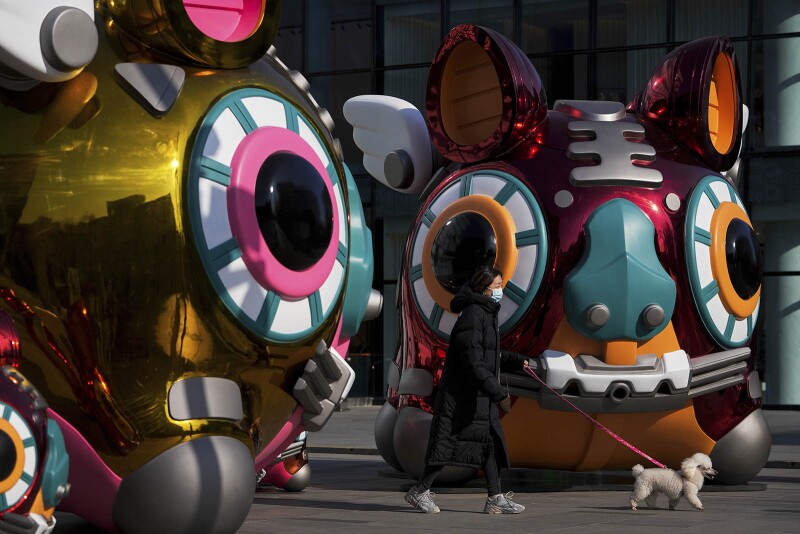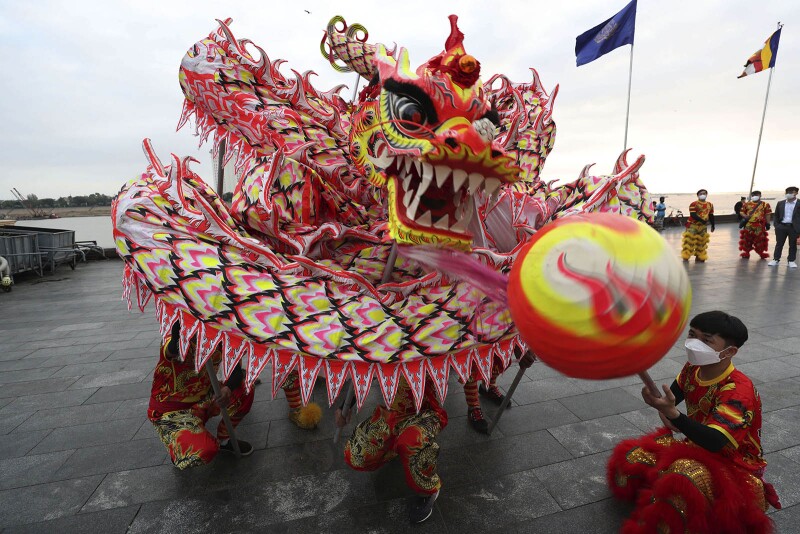People around Asia ushered in the Year of the Tiger on Tuesday, February 1, celebrating the Lunar New Year with colorful decorations, wild dances, tributes to their ancestors, and prayers for good fortune in the year to come.
It is the third Lunar New Year since the start of the COVID-19 outbreak, and again celebrations were more subdued than usual, with people taking strict health and safety precautions, and some traditional festivities either reduced in size or canceled.
The Lunar New Year, also known as the Spring Festival, is the most important annual holiday in China. Each year is named after one of 12 signs of the Chinese zodiac in a repeating cycle. The Year of the Tiger follows the Year of the Ox.
Not surprisingly, depictions of the tiger featured heavily in this year’s decorations, some traditional and others more modern, like robotic-themed tigers at a mall in Beijing.

A woman passes robotic-themed tigers during the Lunar New Year Eve in Beijing.
Photo by AP Photo/Andy Wong
In Cambodia, ethnic Chinese people performed a traditional dragon dance in Phnom Penh, while people prayed for good fortune at the Tai Hong Kong Shrine in Bangkok, Thailand.

People from the Cambodian Chinese community perform a dragon dance in Phnom Penh ahead of Lunar New Year.
Photo by AP Photo/Heng Sinith
In the Japanese capital, the Tokyo Tower was illuminated in red with a display to celebrate the diplomatic relationship between Japan and China, and the Beijing Winter Olympics.
China has doubled down on its pandemic restrictions ahead of the Olympics, which has its opening ceremonies on Friday, February 4. Participants in the Games are being isolated from the general public to try to prevent any cross-infection. They stay in walled-off hotels and can come and go only in special vehicles that take them to the venues and other Olympics facilities.

Lanterns decorate trees near the Olympic Tower at the 2022 Winter Olympics in Beijing.
Photo by AP Photo/Mark Schiefelbein
In Hong Kong, the city’s largest Taoist temple, Wong Tai Sin Temple, was closed because of the pandemic, but people gathered to burn incense sticks and offer prayers at smaller temples that remained open.

Worshippers pray during the Lunar New Year celebrations at the Man Mo Temple in Hong Kong.
Photo by AP Photo/Vincent Yu
“I hope that this year is like a tiger, very energetic,” said Eric Lee, a visitor to the popular Man Mo Temple. “I hope the economy and everyone’s career will be better in the Year of Tiger.”
With additional reporting from Sam McNeil, Liu Zheng, Alice Fung, and Taijing Wu.











